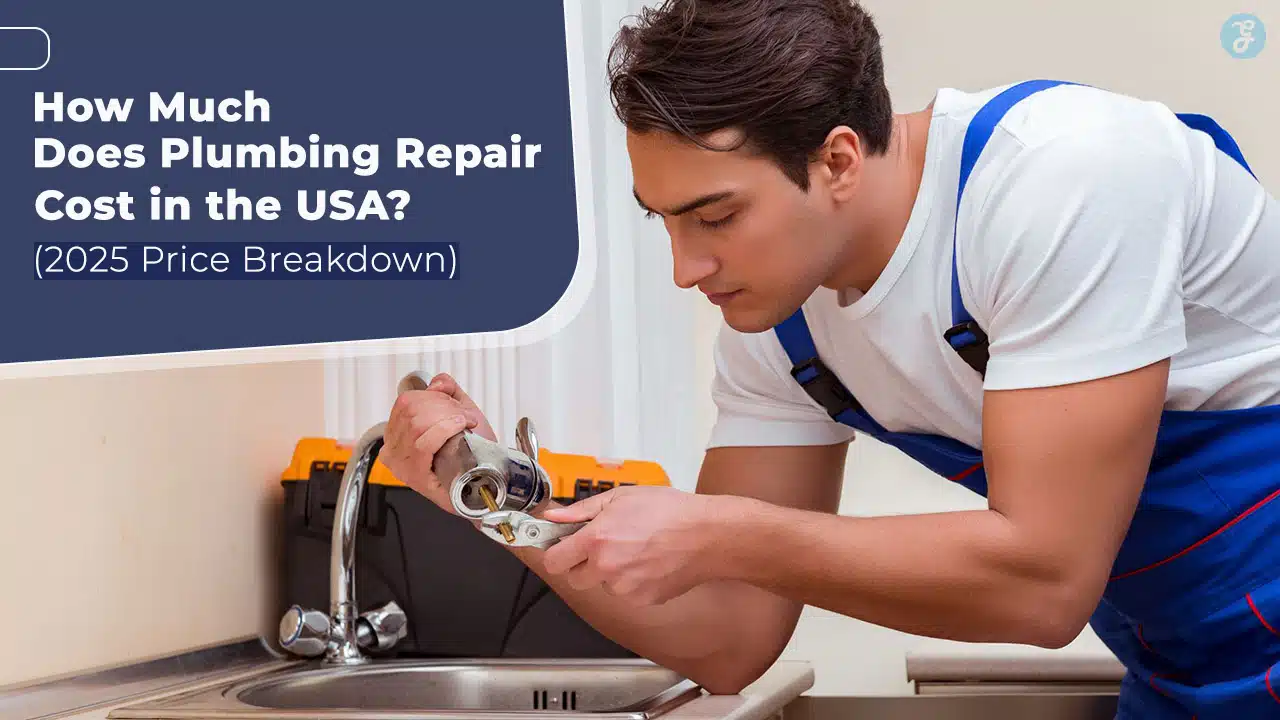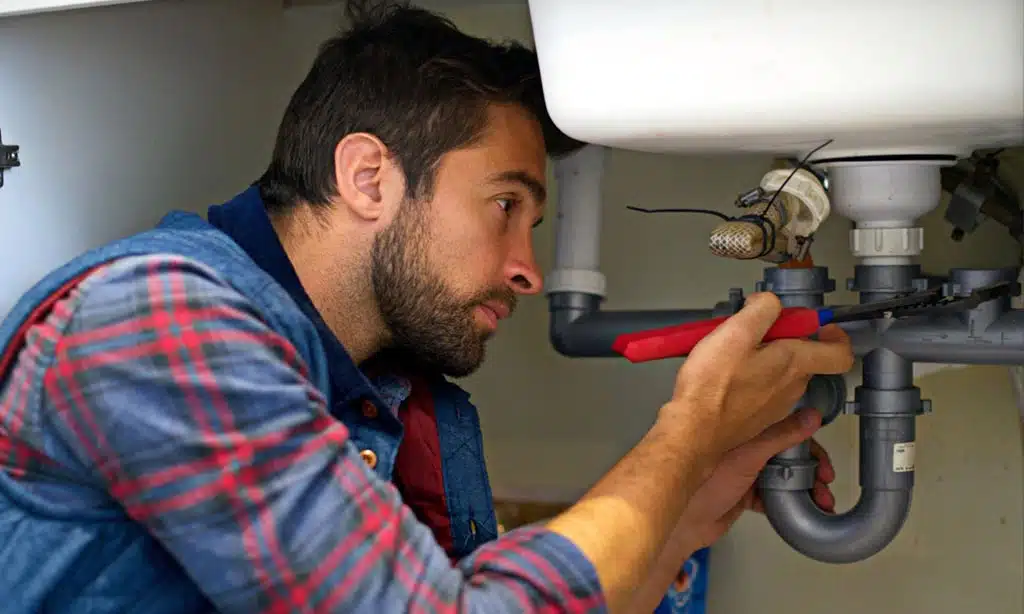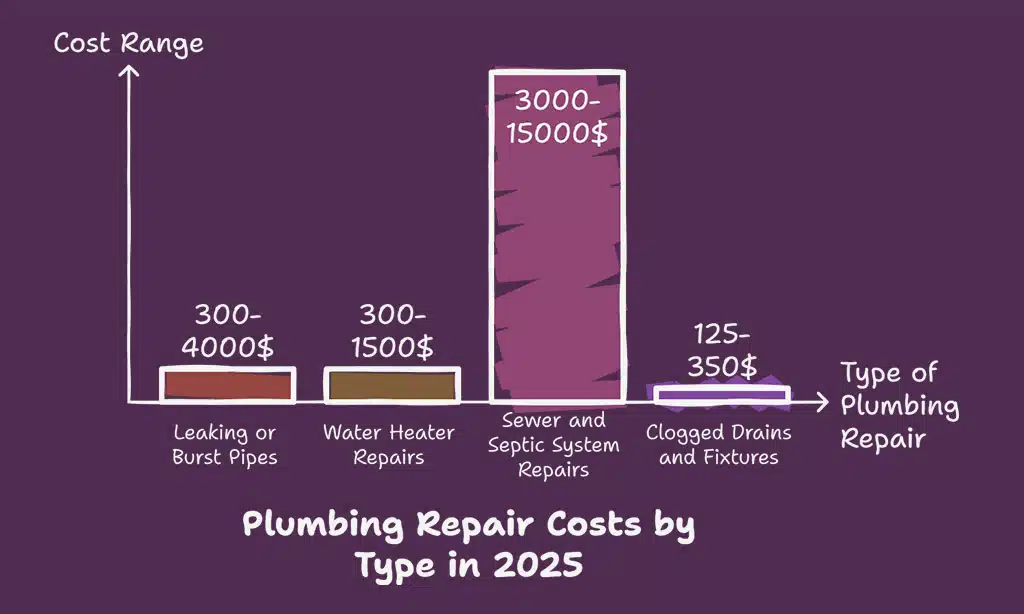Plumbing problems can be a real headache. A leaky faucet or clogged drain always seems to pop up at the worst time. Many homeowners wonder how much fixing these issues will cost, especially in 2025 when prices keep rising.
On average, plumbing repairs in the USA now cost about $315. Small fixes like unclogging a kitchen sink may cost as little as $125, while bigger jobs like burst pipes could run you around $800.
Knowing what to expect can help you plan ahead.
In this post, we’ll break down plumbing repair costs for 2025. We’ll share price ranges, common factors that affect costs, and helpful tips to save money on repairs. Stick around—this guide could save your wallet!
Average Plumbing Repair Costs in 2025
Plumbing repair costs vary widely. Expect to pay more for major fixes than simple jobs.
Small jobs: $125–$350
Fixing a leaky faucet or unclogging drains usually costs $125 to $350. Repairs like replacing sink traps or fixing simple plumbing fixtures fall in this price range too. A licensed plumber often charges flat rates for these small jobs, making them more predictable for homeowners.
Labor costs can vary based on location and the handyman’s expertise. Smaller repairs may use materials like PVC pipes, which are cheaper than copper pipes. Hiring an apprentice plumber might save money compared to calling a master plumber.
But don’t skip quality work—even small issues can cause water damage if ignored!
Larger jobs: $500–$800
Burst pipes or water heater repairs can cost $500 to $800. Jobs like replacing sewer lines or fixing a septic system also fall in this range. Main line leak repairs typically average around $750, depending on severity.
“Big plumbing issues mean big prices.”
Licensed plumbers may charge hourly rates from $45 to $200 for these tasks. Material costs, like copper pipes or PVC pipes, quickly add up. Some jobs require permits, which increase expenses further.
Cost Factors Affecting Plumbing Repairs
Fixing plumbing can cost more depending on the job size and what’s involved. Where you live and the supplies needed also play a big part in prices.
Type of repair needed
The type of repair controls the cost. Fixing a leaky faucet or unclogging a drain can range from $125 to $350. Burst pipes or main line leaks are pricier, often costing $500 to $4,000 depending on severity.
Replacing copper pipes costs more than PVC pipes due to material expenses.
Water heater repairs fall between $200 and $800. Sewer or septic system fixes may climb higher, especially with severe damage. Simple jobs need less work and fewer plumbing tools than complex ones like sump pump replacements.
Each task comes with its own price tag based on effort and materials used.
Labor and expertise level
Plumbing labor costs in 2025 vary by skill level. An apprentice plumber may charge $45 to $90 per hour. A journeyman plumber often charges between $80 and $150 an hour. For complex issues, a master plumber’s hourly rate can go up to $200.
Skilled plumbers bring experience, but expertise has its price tag.
Hiring insured plumbers ensures quality work, though higher fees apply. Complex jobs like septic systems or water heaters often need experts with advanced tools and training. Simple tasks like unclogging drains might cost less if handled by an apprentice or handymen.
Materials and supplies
Copper pipes cost more than PVC pipes, with copper being resistant to corrosion but pricier. PEX pipes are cheaper and flexible, making them popular for repairs in 2025 homes. Plumbing materials like faucets or fixtures can range from $50 to $500 depending on quality.
Plumbing tools add to the expense too. A plumber may need items like a plunger, flange, or sealants for quick fixes. Material costs often depend on the job size; fixing burst pipes is more costly than unclogging drains.
Homeowners should expect material prices to vary by region due to inflation or supply chain issues.
Location and trip fees
Plumbers often charge trip fees based on distance. If you live in a rural area, the fee might be higher. A plumber traveling farther may add $50–$150 to your bill. Busy city areas can have higher rates too because of traffic and demand.
These costs cover gas, time, and overhead expenses for travel. It’s smart to check if flat rates include trip fees or if they’re separate. Always ask upfront to avoid surprises on your invoice!
Plumbing Repair Costs by Type
Different plumbing issues have different price tags, so knowing the type of repair can help you plan better.
Leaking or burst pipes
Leaking pipes can cost $300 to $4,000 to fix. If the main line leaks, expect around $750 for repairs. Burst pipes often need a full replacement, raising costs. Copper pipes are pricier than PVC but last longer.
PEX pipes are cheaper and flexible.
Labor makes up most of the bill. A licensed plumber may charge $90 per hour in 2025. Emergency calls could raise this further. Preventative plumbing maintenance helps avoid major pipe issues and costly water damage repair later on!
Water heater repairs
Fixing a water heater in 2025 costs about $300 to $1,500. Simple fixes like replacing a valve may cost as low as $150. Replacing the entire unit could reach up to $2,000 or more for premium models.
Labor costs from licensed plumbers range between $45 and $200 an hour.
Electric heaters are cheaper to fix than gas ones. Material costs depend on parts like thermostats or heating elements. Older systems may need more work due to outdated plumbing materials such as copper pipes or steel pipes.
Some repairs might need permits, adding extra fees. Regular maintenance helps avoid costly breakdowns later on!
Sewer and septic system repairs
Sewer or septic system repairs often cost between $3,000 and $15,000. Simple clogs or minor fixes may fall below this range, but complex issues like septic tank replacement can push costs higher.
Cracked pipes, blocked lines, or tree root damage are common problems that need attention.
Septic tank cleaning typically ranges from $300 to $500. If your sewer line bursts or leaks severely, expect prices near $2,500 to $4,000. Location also impacts pricing since plumbers add trip fees in many areas.
Regular maintenance helps cut the chance of costly breakdowns later on.
Clogged drains and fixtures
Clogged drains can cost between $125 and $350 to fix in 2025. Prices depend on the problem’s size and materials needed. Simple clogs, like a backed-up sink, may only need basic drain cleaning tools.
Stubborn blockages or damaged pipes often require more work, raising costs.
Fixtures like showers and sinks also face clog issues. Hair, soap, or grease buildup are common culprits. Plumbers may charge hourly rates, averaging $90 per hour nationwide. In some cases, replacing a fixture is cheaper than constant repairs for recurring clogs.
Emergency Plumbing Costs in 2025
Emergency plumbing costs can add up fast, especially after hours. Hiring an insured plumber for urgent fixes might mean paying higher labor fees or flat rates.
Average costs for urgent repairs
Urgent plumbing repairs cost more due to their quick service. In 2025, homeowners may pay $180 to $494 depending on the issue’s severity and time of day. The average cost sits at $336 for emergency visits.
Hourly rates for plumbers range from $45 to $200. Fixing burst pipes or major leaks might need higher-skilled help, pushing costs closer to $750 or more.
Night calls and weekend emergencies increase prices too. You might face extra fees like trip charges and material costs. Common urgent fixes include clogged drains, broken water heaters, or flooding from damaged pipes.
Always check if the plumber is insured before hiring them for critical jobs!
Factors influencing emergency fees
Urgent plumbing repairs often cost more because of their timing. Late-night calls or weekend visits can raise fees by 50% or more. An emergency plumber may charge higher hourly rates, sometimes reaching $200 per hour in 2025.
Travel distance also plays a role. If the plumber travels far, trip fees might add $50 to $150 extra. Materials like copper pipes or special tools can increase costs too, especially if replacements are needed quickly.
Tips to Save on Plumbing Repairs
Simple upkeep can save you a bundle in the long run. Check your pipes and fixtures often to avoid big surprises later.
Regular maintenance
Fix leaks fast to avoid big costs. A leaky faucet can waste gallons of water daily, raising your bill. Check pipes, pex pipes, and pvc pipes for wear every few months to prevent burst pipes.
Clean drains often to stop clogs. Use basic plumbing tools for minor blockages or hire a licensed plumber when needed. Routine care keeps plumbing systems running smoothly and lowers repair bills over time.
Comparing quotes from professionals
Call at least three plumbers for a quote. Compare their prices and services carefully. One may charge an hourly rate, like $90 on average in 2025, while another offers a flat fee. Ask about material costs, labor rates, or any overhead costs they include.
Some jobs, like repairing copper pipes or PVC pipes, can vary by plumber skill level—apprentices might cost less than journeymen or master plumbers. Check if the plumber is licensed and insured before hiring them to avoid unexpected problems later.
Takeaways
Plumbing repairs can feel like a tough nut to crack, but they don’t have to drain your wallet. Small jobs cost less, while bigger fixes need more cash and planning. Comparing quotes makes finding a fair price easier.
Regular check-ups save money in the long run and avoid big messes later. Hiring licensed experts ensures safe results that last. Take action today—your pipes will thank you!
FAQs
1. How much does plumbing repair cost in 2025?
Plumbing repair costs vary based on the issue and location. On average, homeowners pay between $150 and $500 for repairs like fixing a leaky faucet or clearing clogged drains.
2. What factors affect plumbing repair costs?
Costs depend on labor rates, material costs (like copper pipes or PVC pipes), and the type of plumber hired—apprentice, journeyman, or master plumber.
3. Are emergency plumbers more expensive?
Yes, hiring an emergency plumber usually comes with higher hourly rates due to after-hours service and urgent needs like burst pipes or water damage repair.
4. Do I need a licensed plumber for all repairs?
For major issues like replacing water supply lines or installing baths, it’s best to hire a licensed or insured plumber to avoid further problems.
5. Can DIY plumbing save money?
DIYers can handle simple tasks like changing plumbing fixtures but may lack proper tools for bigger jobs involving sewers or basements, leading to costly mistakes.
6. Is preventative maintenance worth it?
Yes! Regular drain cleaning and plumbing maintenance help prevent mold growth, reduce water damage risks, and keep your household running smoothly without surprise expenses.







































